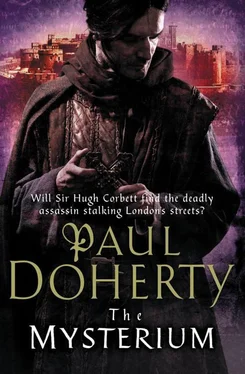‘Sire?’
‘Hugh?’ Edward curbed his growing nervousness.
‘Why did you allow Evesham to burn his manuscripts?’
‘What use were they?’
‘Did they contain secrets harmful to you?’
‘Possibly, but I wouldn’t know, would I.’ The King grinned. ‘They were secret.’
‘And what did you really plan for Evesham, sire? A long stay in Syon, then he’d turn King’s Approver, reveal all the wickedness about the city, the Great Ones at the Guildhall? And why did you ask me to investigate? Did you suspect that Staunton and Blandeford had murdered Evesham after seizing some of his records? Knowing that precious pair, I’d have their chambers searched for any information hurtful to you. Did you, did they, always entertain suspicions about Boniface Ippegrave’s guilt?’
Edward bared his teeth in a smile.
‘And that riot in Newgate? Staunton and Blandeford’s work through their creature Lapwing? You separated the gangs from their leaders. Master Lapwing agitated them, spreading the lie that one coven was about to turn King’s evidence. Why weren’t the prisoners lodged in the Tower? Was the keeper of Newgate told to look the other way? Did he have his secret orders? Lapwing plotted well. He spread a mess of lies about how St Botulph’s could be fortified, that it had a secret passageway out. You wanted to destroy those gangs, separate them from their leaders, and shatter Waldene and the Monk’s power. Perhaps they too, if they survived the pits, could be persuaded to sing the same hymn as Evesham, but Evesham’s murder foiled all that. How could you threaten those two coven leaders if your principal witness was dead? More importantly, Waldene and the Monk, when they were released, were no longer powerful, their retinues annihilated. Whatever, you arranged that riot. The two gangs, caught in open rebellion, would face summary justice, a warning to all the other covens and dagger-men in the city.’
Edward noisily tapped his fingers against the quilted arm of his chair.
‘Lapwing,’ Corbett insisted, ‘he provoked that riot. So did Staunton and Blandeford. In the end, sire, you achieved what you planned: the total destruction of two of London’s most violent gangs. But Lapwing should pay for what he did, as should Staunton and Blandeford.’
‘Lapwing is to be released,’ the King snapped, ‘and restored to office. Staunton and Blandeford are good, faithful servants of the Crown.’
‘Innocents died that day,’ Corbett continued as if talking to himself, ‘poor men and women hastening about their God-given lives. Some were going to the stalls, others to church to pray. They were slaughtered like pigs, the women raped and abused.’
‘Sir Hugh. .’
Corbett slipped the chancery ring off his finger and took off the delicate silver chain around his neck. He placed these carefully on a nearby footstool and rose.
‘I’ll not be going to Kent, sire.’
‘Hugh?’
‘I have resigned from office. I am tired, sick at heart and weary. This is finished and so am I. It’s time for me to be gone.’
‘Hugh, for the love of God, don’t leave me. Not you.’ Edward slammed down his goblet and sprang to his feet, fingers tapping the hilt of his dagger.
‘Really,’ Corbett smiled thinly, ‘will it come to that one day? Sire, I bid you good night.’ He turned and walked out of the chamber, letting the door slam shut on Edward’s shouts.
Ranulf, waiting outside, sprang to his feet.
‘Sir Hugh?’ He stared anxiously at his master’s grim face. The door to the Jerusalem Chamber was flung open and Edward stormed out.
‘Hugh, please!’
‘Master?’
Corbett ignored the King. He clasped Ranulf on the shoulder.
‘As you said, old friend, you have your tasks, I have mine. You know where I am going; you may follow if you wish.’
Edward grasped his arm, but Corbett shook him off, not even bothering to look at him. Then he started purposefully down the darkening gallery, the King’s passionate pleading echoing after him.












